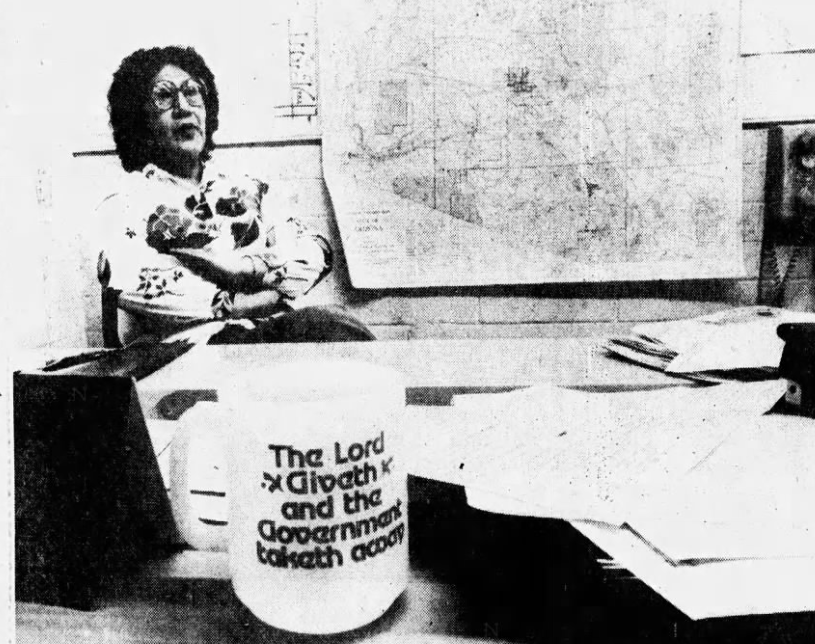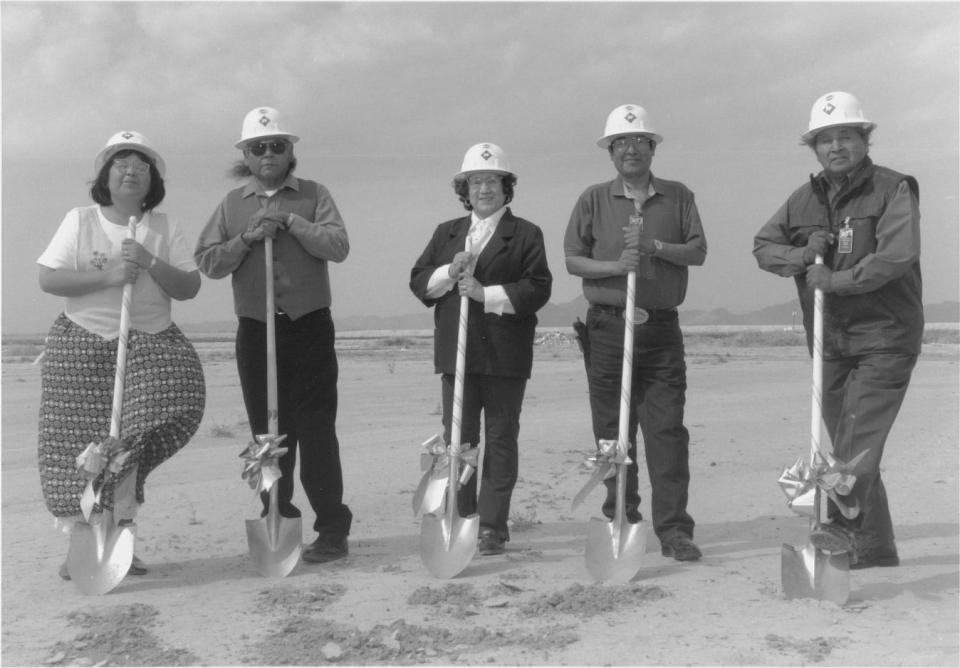'Ak-Chin's greatest leader': Former tribal chair Leona Carlyle-Kakar dies at 88
- Oops!Something went wrong.Please try again later.
Leona Carlyle-Kakar, the first woman to serve as chair of the Ak-Chin Indian Community, as well as a longtime leader in Arizona tribal water rights and agriculture whose name was known all the way to Washington, died April 14. She was 88.
Carlyle-Kakar was one of the architects of Indian Country's first water settlement in 1988, an agreement that opened the door to many others. She also led the effort for the 1,100-member tribe, whose lands are in the Santa Cruz Valley in Pinal County, to take over management of their farms from non-Indian farmers.
Ak-Chin Tribal Chairman Robert Miguel remembered Carlyle-Kakar as a soft-spoken, unflappable presence, whether speaking in O'odham or English. He said young tribal members should take his example and reach out to elders to learn their language, culture and history as well as the leadership skills they will someday need.
"We won't truly move forward and appreciate our achievements without learning or remembering the past," Miguel said.

She urged tribal members to farm their own land
Leona Kakar was born March 29, 1936 in Casa Grande, the daughter of Hiram John Carlyle and Tillie Barbara (Romo) Carlyle. She had two brothers and a sister.
After high school, she married Joe Kakar in Winterhaven, California, in 1968. The couple farmed and ranched and raised a blended family of 16 children. Ultimately, the Kakars had more than 110 grandchildren and great-grandchildren. Carlyle-Kakar was also a great-great-grandmother of five.
Like other O'odham peoples, the Ak-Chin O'odham, or "people who live at the mouth of the wash," have farmed in the Sonoran Desert for millennia, and Carlyle-Kakar fought hard for her tribe's right to farm and profit on their own lands.
Carlyle-Kakar told the Maricopa Monitor that she and her brothers met with other Ak-Chin members underneath a tree to present their ideas to organize and farm their own land instead of leasing it to non-Indian farmers, who profited off Ak-Chin land and labor.
“We got people together and told them they would have jobs and the community would be better off if we did this,” she said. “We knew we could make money, but the (Bureau of Indian Affairs) said it would never work.”
But Carlyle-Kakar and other Ak-Chin leaders made it work, and work well. After organizing the tribal government in 1961, she and other tribal leaders grew the tribe's farming operation from 4,000 acres to 15,000 acres, and today, about two-thirds of the tribe's land base is farmland.
Under her 50-year leadership as chairman of the farm board, Ak-Chin Farms became known as one of the nation's largest successful farms, growing potatoes, cotton, barley, alfalfa and corn.
Carlyle-Kakar also served on Ak-Chin's tribal council for 40 years. She held nearly every council position from council member to chairman, the first Ak-Chin woman to hold the title.

In addition to building an agricultural powerhouse and helping secure Ak-Chin's future through the water settlement in 1984, Carlyle-Kakar also led the effort to turn some of the tribe's hard-won farmland into a casino in 1994.
The casino is now the heart of an entertainment complex including a hotel and conference center, a family entertainment center and a movie theater.
Tribes and water: Their pleas for water were long ignored. Now tribes are gaining a voice on the Colorado River
'Just be yourself and you'll do fine'
Ak-Chin Tribal Chairman Miguel said he knew Carlyle-Kakar for his entire life and was privileged to be mentored by her during his first year in leadership while she was in her final year as farm board chairman. She finally retired from the farm board in 2016 at age 80 after serving as chairman for 51 years.
"I took that opportunity to learn leadership from her," he said.
Miguel said some of the most valuable lessons he received from Carlyle-Kakar were more in the way of character building than how to run a meeting.
New development: No small potatoes: Federal funding will help tribes expand electric service, irrigation
"She would say, 'Just continue to be Robert and you'll be fine,'" he said. She also advised Miguel over their many hours of private conversations to know his community well, and to be consistent in decision making. "I may not have made decisions that all the community agreed with but they always supported me because I was consistent," he said.
"I was so blessed to have the opportunity to have her in my life."
"When I look out my window at the tribal office, I see the farms, the fields, the water and the infrastructure, the homes here," Miguel said. "That's Leona Kakar to me."
Leona Kakar's name remembered in Washington and Arizona
Carlyle-Kakar's name won't soon be forgotten in Washington, D.C. Miguel said that when he travels to the capitol on tribal business and introduces himself as a representative from Ak-Chin, "the first thing they mention is Leona."
"Her name lives on."
Carlyle-Kakar is survived by children Charlie, Nancy and Carla Carlyle, Raychel Peters, Frances Kakar, Denise Goins, Cecelia Davis, Delsey Kinnard, Joseph Kakar, Thomas Kakar, Ann Marie Antone, Delita Nunez, Anita Zapata, Wendy Wagner and numerous grandchildren, godchildren, nieces and nephews.
Debra Krol reports on Indigenous communities at the confluence of climate, culture and commerce in Arizona and the Intermountain West. Reach Krol at debra.krol@azcentral.com. Follow her on X, formerly Twitter @debkrol.
Coverage of Indigenous issues at the intersection of climate, culture and commerce is supported by the Catena Foundation.
My articles are free to read, but your subscriptions support more such great reporting. Please consider subscribing today.
This article originally appeared on Arizona Republic: First Ak-Chin woman to serve as chairman Leona Carlyle-Kakar dies

